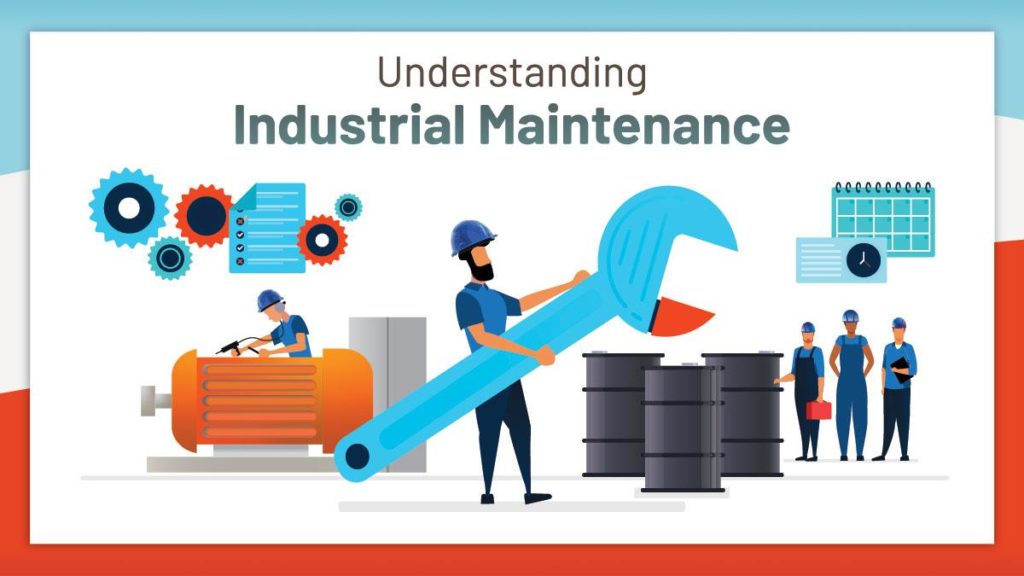What Is Industrial Maintenance?
Industrial maintenance, also called plant maintenance, is the process of implementing processes to reduce breakdowns, increase uptime, and promote overall reliability. In other words, maintenance is the general process of ensuring that assets are kept in good working condition.
When a piece of equipment keeps running at its expected capacity, production operations are likewise sustained. Having a maintenance plan reduces maintenance costs, maximizes uptime potential, and ultimately increases profitability.
Relying on a third-party service contractor to repair failed components after the fact is not a sustainable maintenance plan. In addition to the high servicing costs with third-party contractors, this approach puts you at a higher risk of unscheduled downtime from a sudden, unexpected failure.
A proper maintenance plan can identify maintenance tasks that prevent failures in the first place, saving your company more in the long term.
What Are Some Good Examples of Maintenance Strategies?
The degree and frequency by which maintenance tasks are carried out vary depending on the maintenance strategy that an organization chooses to practice. Here are three examples.
Reactive Maintenance
As the name suggests, reactive maintenance is concerned with tasks that come after a piece of equipment breaks down. The advantage of reactive maintenance is that the initial costs are significantly lower. Maintenance tasks are only carried out when a machine is already showing signs of poor performance.
The downsides of reactive maintenance outweigh the short-term benefits. The cost of performing minimal maintenance is the likelihood of irreversible damage from sudden failure. These failures typically result in production losses, with worse cases leading to the damage of critical equipment. For assets that are essential for operations, perform reactive maintenance only as a last resort.
Preventive Maintenance
The goal of having a more proactive approach in maintenance is to mitigate potential causes of failure before they even occur. A preventive maintenance (PM) strategy requires doing tasks proactively according to a usage- or calendar-based schedule. One common example is getting an oil change in your car after running for a certain number of miles.
PM tasks can significantly reduce unplanned downtime by avoiding conditions that cause breakdowns. This also reduces the risk of catastrophic failure with a reactive approach. By investing in a PM strategy, maintenance costs are reduced compared with when acting reactively. Savings are realized when factoring in safety standards, productivity losses, and total repair costs.
Like with getting an oil change for your car, by following a plan you can avoid more costly problems.
While a traditional PM program has its strengths, there is still room for improvement. Schedules based on usage or time can potentially trigger tasks to be carried out unnecessarily. To optimize the amount of servicing required , perform a more sound analysis with the availability of data and information, such as in a reliability-centered maintenance strategy.
Reliability-Centered Maintenance (RCM)
Reliability-centered maintenance (RCM) is one of the more specialized forms of proactive maintenance ―with an emphasis on being proactive. Similar to a traditional PM strategy, RCM aims to avoid failures by analyzing the best actions to take. Think of RCM as a game plan that develops tailor-made maintenance strategies, depending on what best suits the particular equipment.
RCM takes into account the criticality of an asset alongside potential causes of failure and corresponding corrective actions. The result is that equipment within the same facility could be assigned different maintenance strategies. This way, you are able to more efficiently allocate resources where needed. In contrast, PM sets rather rigid schedules on when maintenance tasks should be performed.
For RCM to be effective, it requires more information about your assets compared to reactive or preventive maintenance. The smart way to obtain and analyze data about your equipment is with the use of computerized maintenance management system (CMMS) software. With a CMMS, you can keep track of which types of equipment are assigned which types of maintenance strategies. For example, non-critical and redundant equipment such as light bulbs can be handled reactively. Other consumables with known failure patterns and lifespans can be assigned with calendar-based PM tasks.
Who Are Considered Industrial Maintenance Workers?
Industrial maintenance workers are generally categorized into two main types: mechanics and engineers. Each group would have its own key areas of responsibility. By assigning clear accountabilities, these groups can more efficiently perform their respective specialized tasks.
Industrial Maintenance Mechanic
Numerous industries require industrial maintenance mechanics. To put it simply, any company that uses machines with moving parts would require the services of a maintenance mechanic.
The general roles of a mechanic include the installation, disassembly, repair, and maintenance of machines. They are trained to execute preventive maintenance procedures with keen attention to detail. They are also expected to be observant of the mechanical performance of components.
A trained and experienced maintenance mechanic would know how to listen to sounds that may indicate a broken part. On top of that, they are also required to be able to perform measurements and tests that can further assess equipment performance.
Industrial Engineer
Industrial engineers develop processes that they ensure can be carried out efficiently and effectively. They optimize resources by planning, designing, and implementing the operations of a company. With the use of mathematical models and analysis tools, industrial engineers are able to make decisions on the maintenance strategies to employ.
In contrast with mechanics, industrial engineers are less likely to perform the actual execution of tasks. Instead, they are more concerned with the planning stages of the maintenance activity. For example, an industrial engineer might collaborate with maintenance teams and management to assign the most suitable maintenance strategy to a machine.
What Are Other Types of Industrial Maintenance Workers?
Aside from the mechanics and engineers, you can expect other workers on the floor that contribute to the plant’s maintenance. Here are examples of these industrial maintenance workers.
Maintenance Technician
Maintenance technicians are the go-to workers for general maintenance work. They are usually assigned in groups that would perform specifically-assigned tasks. Tasks include various preventive and reactive maintenance activities with varying levels of complexity.
Technicians are understandably confused with maintenance mechanics. The main difference between these two roles is the scope of tasks that they handle. Maintenance technicians usually take on a more specialized skill set.
Maintenance Planner
Mechanics and technicians can only perform their jobs if they have the right parts on hand―and that’s where the maintenance planner comes in. The maintenance planner ensures that the parts required are available in time for a scheduled activity. In smaller operations, the maintenance planner would also assume the role of a maintenance scheduler.
Maintenance planners communicate across the organization. They are equipped with the information they gain from coordinating with technicians and mechanics, as well as data from the CMMS software. This puts them in a position to more objectively prioritize tasks.
Maintenance Supervisor
The plant’s maintenance supervisor looks after the activities of the technicians. The supervisor performs rounds to ensure that tasks are performed on time and according to the agreed schedule. The supervisor should also coordinate with the maintenance planner and scheduler on a regular basis. This way, the supervisor can have a clear view of the tasks at hand and allocate resources accordingly.
The supervisor also manages the metrics and key performance indicators (KPIs) of the team. Part of this work requires them to assess the work performed by technicians individually and as a group. For example, supervisors are expected to perform specific quality assurance inspections, as well as evaluate general periodic KPIs like repair times.
Maintenance Manager
One position up from the supervisor is the maintenance manager. The maintenance manager oversees a group of maintenance supervisors while reporting to either a director, vice president, or president.
Managers look at the maintenance department from a high level. And they manage and direct the long-term objectives of the organization from a maintenance and reliability perspective. Responsibilities of the maintenance manager include setting the strategy for the whole department.
Typical performance indicators that the maintenance manager drives are production uptime targets, safety metrics, budget alignment, and overall compliance to standards. Depending on the organization’s mode of operation, there are potentially a number of varying types of maintenance managers . For example, a plant maintenance manager may have an entirely different experience and skill set to a public works or facilities maintenance manager.
Which Industries Utilize Industrial Maintenance?
Any company that owns and operates machines requires some form of industrial maintenance. Here are some practical examples of how industrial maintenance is used across different industries.
Food Processors
Food processing plants have all sorts of complicated and sensitive equipment, such as automated machines to prepare food, including peelers and sorters. Also expect large-scale cooking equipment like ovens, cookers, and fryers. Other plants might also require massive refrigeration units to preserve either raw materials or finished products. On top of all these components, food processing plants also require strong enforcement of sanitation standards when performing any work, including maintenance.
Refineries
It takes a lot of heat and chemistry to operate refineries. You’re dealing with extreme temperatures and pressures as well as potentially corrosive substances. Components such as heat exchangers, furnaces, boilers, and reactors require regular maintenance work. All fasteners and piping equipment that connect them also need to be looked after.
Energy
Both commercial and residential areas heavily rely on energy 24 hours a day, seven days a week. This puts an enormous amount of obligation on the side of the energy sector to operate at maximum reliability. All components required to harness, produce, and even distribute energy would need to be under a comprehensive industrial maintenance strategy.
Construction
Companies that produce construction materials operate numerous types of heavy equipment and machinery. These include milling machines, CNC machines, conveyors, motors, and so on. These components usually utilize large amounts of force, which would translate to equal portions of wear and tear. Some components, particularly those with complex electrical circuits, might need additional experts to safely perform maintenance work.
Printing Presses
Printing presses make use of repetitive motion to consistently produce high volumes of product. With their constantly rotating motion, equipment is vulnerable to material stress and fatigue. Printing presses, in particular those that have been operating for a while, should have a maintenance plan in place.
Which Industrial Maintenance Certifications and Training Can I Get?
It takes a combination of technical skills and practical knowledge to become an effective industrial maintenance professional. After all, the upkeep of the core equipment of a facility lies in the hands of the maintenance workers. Because of the responsibility that goes with the job, evaluations were designed to increase the credibility of a certified individual. Here are a few examples of industrial maintenance certifications.
Certified Maintenance and Reliability Technician (CMRT)
Previously recognized as the Certified Industrial Maintenance Mechanic (CIMM) certification program, the CMRT certification program is a leading assessment program for maintenance technicians. This certification is offered by the Society for Maintenance and Reliability Professionals (SMRP). Competency tests for this certification include maintenance practices, preventive and predictive maintenance, troubleshooting and analysis, and corrective maintenance.
Certified Maintenance and Reliability Professional (CMRP)
CMRP certification is another program offered by the SMRP. This program is also accredited by the American National Standards Institute (ANSI), following the standards set by the International Standardization Organization (ISO). The CMRP program is more applicable to maintenance professionals who would also oversee maintenance from an administrative level. The program includes topics such as business and management, equipment reliability, manufacturing process reliability, organization and leadership, and work management.
The International Maintenance Institute (IMI) Certification
The International Maintenance Institute (IMI) offers varying levels of certification depending on the area of expertise required. Training modules range from technical skills to management skills. Each level corresponds to a respective curriculum of skills. Here are some of the credentials.
- Certified Maintenance Technician I
- Certified Maintenance Technician II
- Certified Maintenance Technician III
- Certified Maintenance Professional
- Certified Maintenance Manager
Industrial Maintenance News and Resources
The world of maintenance is evolving every day. Organizations from all industries are always on the lookout for best practices and innovative processes. Here are some links to news and updates about the maintenance world, and how emerging technologies are changing the game.
Manfacturing.net
Features news and educational content with a strong focus on aerospace, automotive, energy, and industrial operations.
Plant Services
A comprehensive library of news, case studies, white papers, and special reports that you can customize according to your preference.
Reliability FM
A list of podcasts picked by Accendo Reliability that features leading experts and innovators of the maintenance world. Among the list of podcasts is Masterminds in Maintenance , a series that highlights up and coming ideas in maintenance with UpKeep’s founder, Ryan Chan.



![[Review Badge] GetApp CMMS 2022 (Dark)](https://www.datocms-assets.com/38028/1673900459-get-app-logo-dark.png?auto=compress&fm=webp&w=347)
![[Review Badge] Gartner Peer Insights (Dark)](https://www.datocms-assets.com/38028/1673900494-gartner-logo-dark.png?auto=compress&fm=webp&w=336)
